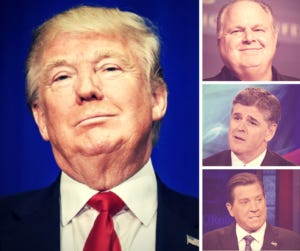Perhaps the only unsurprising element of the 2016 election was that much of the mainstream media's general-election coverage was biased against the GOP presidential nominee. Republican politicians have long had to deal with the extra hurdles placed in front of them by an industry dominated by liberal group-think, and this year was certainly no different.
Donald Trump and his supporters were held to a different standard than their Democratic counterparts, but it went a bit beyond that. Trump's offensive rhetoric, chronic dishonesty, and incessant vilification of the press (even when their reporting was responsible and accurate) made it all the more difficult for a number of liberal journalists to exercise the level of personal discipline required to provide fair coverage. Still, it was their job to maintain such discipline, and in letting their vindictiveness seep through in their coverage, they failed to perform it.
Trump, of course, won anyway. And now there's a lot of discussion in the world of punditry about what the media should learn from the experience, and how they should cover the 45th president of the United States once he takes office.
Some on the Right have suggested that the news-media industry is now irrelevant. They've pointed out that Trump has found a way to break through its ideological narratives, and talk directly to Americans through social media.
While there's no doubt that Twitter, in particular, has provided Trump with an effective means of fast and direct communication with the public, the notion that it could (or even should) replace news journalism is a frightening one. In a free society, it's important that elected leaders and other government entities be held accountable by those they work for, and an inquisitive, challenging press is a mechanism by which that is supposed to happen.
Of course, many would scoff at the notion that the mainstream media has held the Obama administration (and the Democratic party for that matter) accountable, and they would be right. Aside from the obvious ideological kinship, a lot of controversies and scandals that would have come under intense scrutiny with a Republican president fell by the wayside under Obama, and it was indeed another deep, dark stain on the field journalism.
Can the liberal media ever be reformed? I suppose that anything's possible, but it certainly won't come as a result of self-reflection. That's why the work of the conservative media to expose liberal bias, debunk liberal narratives, and offer an alternate perspective on the news, has been invaluable over the years.
But something changed in this past election-cycle. Several in the conservative media took part in a fairly radical experiment in a quest to expand their audiences (and in some cases, their personal relationships). Rather than continuing to serve as a counterbalance against the liberal slant of the industry, they traded in their long-preached principles and re-branded themselves as high-pressure salespeople for a celebrity presidential candidate who had the strong interest of the American public.
They went all-in, almost appearing as if they had researched the most blatant examples of the liberal media's pro-Obama advocacy, and regurgitated them (on a daily basis) in the name of Trump.
Over the past 18 months, we've witnessed so much embarrassing adulation (complete with philosophical flip-flops) over Trump that I can't help but think that MSNBC's Chris Matthews is owed a deep apology. These Trump sycophants, after all, were the same media-conservatives that gave Matthews eight years of grief over his infamous "thrill up my leg" moment. And they were way worse than he was. One of them even wrote a cowboy fantasy piece about Trump back in June.
With Trump winning the presidency, and these people (and their outlets) indeed reaping the rewards of larger audiences, it's quite possible that the conservative-media revolution, that we've watched take shape over the past 20 years, is effectively coming to an end.
Prior to the election, the popularity of the conservative media had been in decline across all platforms. Trumpism, however, breathed new life into the niche market, and its momentum has only strengthened since the election.
As a result, the sector of the media that has long prided itself on offering a multitude of earnest, right-leaning views and perspectives has turned strikingly tribalistic in its commitment not to ideas, but rather to one specific individual: Donald Trump. The evidence has been resounding.
When a conservative-media icon like Rush Limbaugh starts salivating over the idea of a trillion-dollar stimulus plan under Trump, you know that something big has occurred.
When the prominent right-leaning news sites are now indistinguishable from celebrity fan-club hubs, it's clear there's a new sheriff is in town.
When certain Fox News shows have morphed into hour-long infomercials for Trump enthusiasts, where the president-elect's words are reliably rationalized, and his opponents (from both sides of the aisle) are reflexively attacked, the sea-change is undeniable.
Who needs Trump TV, after all, when there's an entire sector of the market that's ready and willing to bend over backwards to promote the Trump doctrine (whatever that happens to be on any given day)?
Of course, not everyone on the Right is selling out. The hard-news people have kept their integrity. So have those who managed to remain intellectually consistent throughout the election, despite the pressure placed on them not to. Their work environment, however, is decisively different...and noticeably uncomfortable.
This all begs the question: Is this really the news-media landscape that righties want -- their platform pushed through a media-filter of innate brand-building instead of principled arguments and a keen alertness to hypocrisy?
Maybe the answer is yes. Maybe the taste of victory in November sent the signal that a conservative-minded media just isn't as important as one that promotes the interests of a charismatic individual who transcends political ideology -- as long as The Left, at the end of the day, is still the villain.
I suppose it will be the free market that decisively answers that question.



